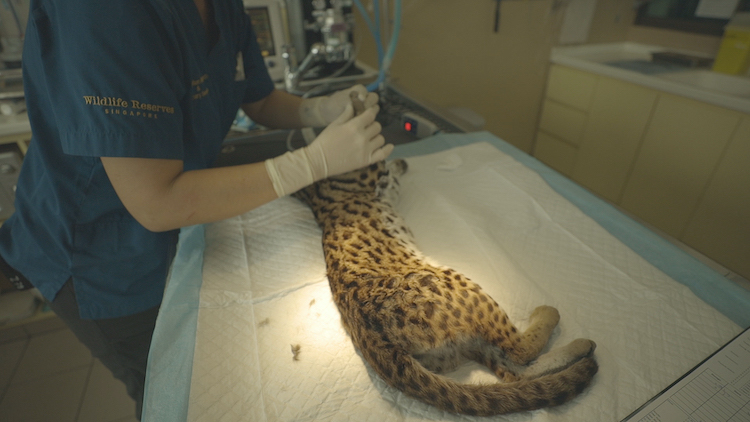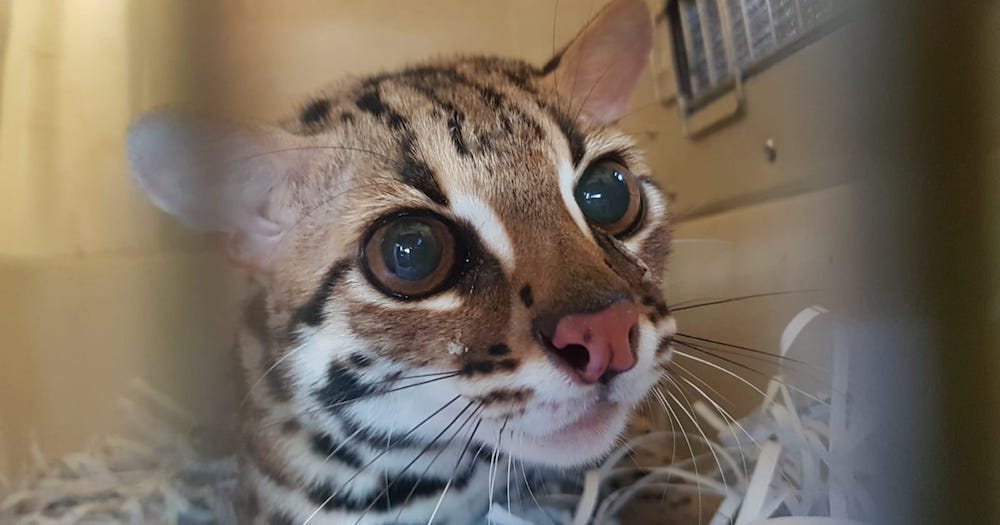In a press release on Feb. 7, ACRES, the National Parks Board (NParks) and Wildlife Reserves Singapore (WRS) announced the successful return of two rescued leopard cats (Prionailurus bengalensis) to the wild.
These small felines, which grow to the size of a regular domestic cat, were returned back to the wild in Perak, Malaysia on Jan 22, 2020.
The leopard cats were illegal exotic pets
On Jul. 19, 2018, the ACRES Animal Crime Investigation Unit (ACIU), received a tip-off about two leopard cats, one male and one female, being kept as illegal pets in a HDB unit.
After the information was verified to be true, the case was referred to the authorities and the animals were removed from the flat.
Using genetic testing, it was found that the felines' lineage from originally from Malaysia, which meant that they were illegally imported into the country.
The owner was given a fine of S$500 for importing two exotic animals, under the Endangered Species (Import and Export) Act (ESA).
According to the release, the Asian Leopard Cat is one of the last remaining wild cats in Southeast Asia, and the last remaining wild cat species in Singapore.
It is also considered critically endangered here, due to loss of its natural forest habitat and possibly illegal poaching.
Rehabilitation of the felines involved a hands-off approach
After the animals were removed from the apartment, they were handed over to the WRS’s Wildlife Healthcare and Research Centre (WHRC) at the Singapore Zoo.
To prepare the leopard cats for a second chance in the wild, the two adult leopard cats were given natural foods that they would find in the wild and given enrichment for mental and physical stimulation.
Dr Sonja Luz from WRS mentioned that interaction between the leopard cats and humans were kept to a minimum and the team took a hands-off approach to reduce the chances of the felines getting used to the presence of people.
She added:
"We have to remember that these animals, especially potentially dangerous ones like these Leopard Cats, are wild by nature and can injure people.
WRS takes a strong stand against the illegal wildlife trade. By taking wildlife away from their natural environment, it not only causes harm to the animal but also poses irrefutable risk of extinction to the wild population."
Before their release into the wild, the leopard cats were also required to undergo health and behavioural assessments to ensure that they were ready.
 Photo by WRS
Photo by WRS
The pair will be monitored in the wild by the Malaysian authorities
After their rehabilitation in Singapore, the pair of leopard cats were microchipped by WRS and handed over to the government officials in Malaysia.
They have been taken to the National Wildlife Centre in Perak, Malaysia, where they will undergo further rehabilitation.
The pair will be released in an undisclosed forest location and will be monitored by government officials to ensure that they are doing well after their release.
Tackling the illegal wildlife trade is a combined effort
In a statement to the press, the various agencies involved in the repatriation project deemed it as a victory for wildlife against poachers and the illegal wildlife trade as these animals were returned to their natural habitat.
Deputy Chief of ACRES, Ms Anbarasi Boopal, shared that the ACRES crime unit saw over 500 online listings selling prohibited wild animals in Singapore.
She added:
"This shows the pressing need to tackle the illegal wildlife trade issue through increased awareness and enforcement. We are thrilled to see this case to the end, as confiscated wildlife deserve a second chance - thanks to the rehabilitation efforts from the WRS, and the support from NParks and Perhilitan to facilitate the repatriation”.
According to the law under the ESA, any person is found to be in possession of or selling illegally imported species listed under CITES can be fined up to S$50,000 per scheduled species (not exceeding a maximum aggregate of S$500,000), up to two years imprisonment, or both.
In a joint statement, ACRES, the National Parks Board (NParks) and WRS reminded the public not to keep wild animals as pets.
Members of public help fight the illegal wildlife trade by alerting NParks on any suspected cases of illegal wildlife trade that they might come across.
Hotlines to tip off illegal pets
ACRES: 9783 7782
NParks: 1800-471-7300 or www.nparks.gov.sg/feedback
Information shared with NParks will be kept strictly confidential.
Top photo by ACRES
If you like what you read, follow us on Facebook, Instagram, Twitter and Telegram to get the latest updates.
